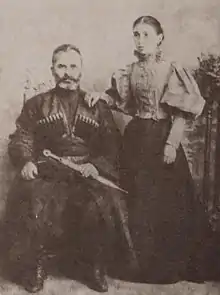
Mouravi Mose Memarnishvili with his wife
Mouravi (Georgian: მოურავი) was an administrative and military officer in early modern Georgia, translated into English as seneschal, bailiff, or constable. A mouravi was an appointed royal official who had a jurisdiction over particular town or district. In towns, the mouravi was assisted by a police officer, natsvali.[1] The best-known mouravi in Georgian history was Giorgi Saakadze, called "the Grand Mouravi."
References
- ↑ Suny, Ronald Grigor (1994), The Making of the Georgian Nation: 2nd edition, p. 340. Indiana University Press, ISBN 0-253-20915-3
This article is issued from Wikipedia. The text is licensed under Creative Commons - Attribution - Sharealike. Additional terms may apply for the media files.